| |||||||||||||||||||||
| |||||||||||||||||||||
| |||||||||||||||||||||
The Liberty Korea Party held a leadership election on 3 July 2017. It was the first election since the Liberty Korea Party became an opposition party. [1]
| |||||||||||||||||||||
| |||||||||||||||||||||
| |||||||||||||||||||||
The Liberty Korea Party held a leadership election on 3 July 2017. It was the first election since the Liberty Korea Party became an opposition party. [1]
The ratio of the results by sector was 70% for delegates, 30% for opinion poll.
| Candidate | Delegates | Opinion poll | Total points |
|---|---|---|---|
| Hong Jun-pyo | 40,194 (72.7%) | 49.4% (11,697 pts) | 51,891 (65.7%) |
| Won Yoo-chul | 11,021 (19.9%) | 30.0% (7,103 pts) | 18,125 (23.0%) |
| Shin Sang-jin | 4,036 (7.3%) | 20.6% (4,877 pts) | 8,914 (11.3%) |
| Total | 55,251 | 23,677 pts | 78,930 |
The Liberty Korea Party (Korean: 자유한국당) was a conservative political party in South Korea that was described variously as right-wing, right-wing populist, or far-right. Until February 2017, it was known as the Saenuri Party, and before that as the Hannara Party from 1997 to 2012, both of which are still colloquially used to refer to the party. The party formerly held a plurality of seats in the 20th Assembly before its ruling status was transferred to the Democratic Party of Korea on 27 December 2016, following the creation of the splinter Bareun Party by former Saenuri members who distanced themselves from President Park Geun-hye in the 2016 South Korean political scandal.

Hong Joon-pyo, also spelled as Hong Jun-pyo, is a South Korean politician and former prosecutor who is the current Mayor of Daegu. He previously served as the governor of South Gyeongsang Province, a member of the National Assembly for five terms, and the party leader of the conservative Grand National Party in 2011 and its successor incarnation the Liberty Korea Party from 2017 to 2018.

Early presidential elections were held in South Korea on 9 May 2017 following the impeachment and removal of Park Geun-hye. The elections were conducted in a single round, on a first-past-the-post basis, and had originally been scheduled for 20 December 2017. However, they were brought forward after the decision of the Constitutional Court on 10 March 2017 to uphold the National Assembly's impeachment of Park. Following procedures set out in the Constitution of South Korea, Prime Minister Hwang Kyo-ahn succeeded Park as the acting president. After Park was removed from office by the Constitutional Court's ruling, acting president Hwang announced he would not run for a term in his own right.

Hwang Kyo-ahn is a South Korean politician and prosecutor who served as acting president of South Korea from 9 December 2016 to 10 May 2017 and the prime minister of South Korea from 18 June 2015 to 11 May 2017.

Yoo Seong-min, also known as Yoo Seung-min, is a South Korean economist and politician. Yoo is former a member of the Korean Parliament and was the Bareun Party's presidential nominee in the 2017 South Korean presidential election. He is the son of late Daegu court chief, attorney and Member of Parliament, Yoo Soo-ho for Junggu of Daegu.

Legislative elections were held in South Korea on 15 April 2020. All 300 members of the National Assembly were elected, 253 from first-past-the-post constituencies and 47 from proportional party lists. They were the first elections held under a new electoral system. The two largest parties, the liberal Democratic Party and the conservative United Future Party, set up new satellite parties to take advantage of the revised electoral system. The reforms also lowered the voting age from 19 to 18.
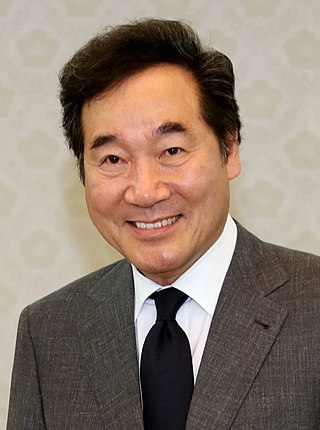
Lee Nak-yon is a South Korean politician who served as the prime minister of South Korea from 2017 to 2020. A member of the New Reform Party, he is the longest-serving prime minister since the Constitution of South Korea was last revised in 1987. Lee previously held the governorship of South Jeolla Province province from 2014 to 2017, a stronghold of his party. Before serving as governor, he worked as a journalist for over 20 years and served as a member of the National Assembly for four terms.
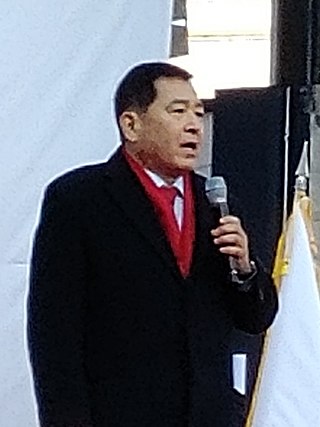
Shim Jae-chul is a South Korean journalist and politician. He is a current member of the National Assembly and the Floor Leader of the United Future Party.
The Democratic Party held a leadership election on 25 August 2018. It was the first leadership election since the inauguration of President Moon Jae-in. The elected leader was slated to serve a 2-year term.

Yu Eui-dong is a South Korean conservative politician who is a Member of National Assembly for the Pyeongtaek B constituency since 2014.

The Future Korea Party was a political party in South Korea formed on 5 February 2020.

The People Power Party, formerly known as the United Future Party, is a conservative and right-wing political party in South Korea. It controls the South Korean presidency and is the second-largest party in the National Assembly. The PPP, along with its historic rival, the Democratic Party, make up the two largest political parties in South Korea.

Park Wan-su is a South Korean politician serving as the Member of the National Assembly for Changwon Uichang since 2016. He was also the Secretary-General of the United Future Party (UFP) in 2020.
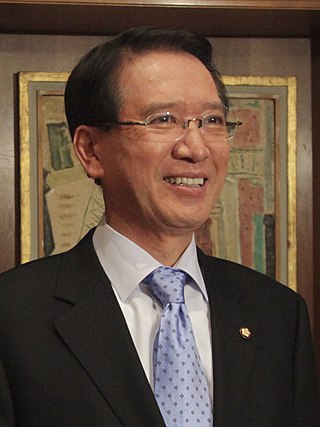
Kim Hyong-o is a South Korean writer and politician. He was a long-term Member of the National Assembly for Yeongdo from 1992 to 2012. During the parliamentary career, he served as the Speaker of the National Assembly from 2008 to 2010.
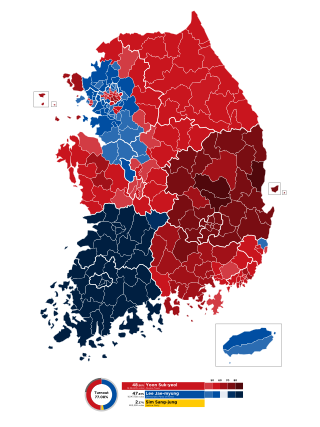
Presidential elections were held in South Korea on 9 March 2022. Under the South Korean constitution, presidents are restricted to a single five-year term, meaning that incumbent president Moon Jae-in was ineligible to run for a second term. Opposition candidate Yoon Suk Yeol of the People Power Party won the election, defeating candidate Lee Jae-myung of the incumbent Democratic Party.
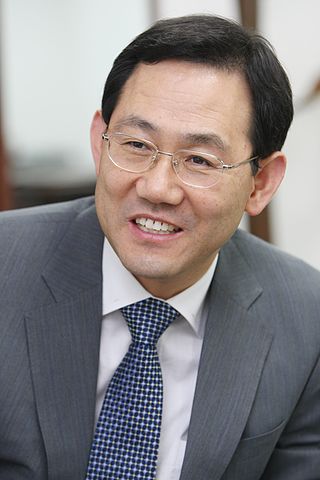
Joo Ho-young is a South Korean judge and politician who served as the interim Chairman of the conservative United Future Party (UFP)/People Power Party (PPP) in May 2020, and again from 8 to 30 April 2021. He has been the incumbent Member of the National Assembly for Suseong 1st constituency since 2020; before that, he represented for 2nd constituency from 2004 to 2020. He was the Minister for Special Affairs under Lee Myung-bak from 2009 to 2010.

The Democratic Party held a leadership election on 29 August 2020. It was the second leadership election since the inauguration of President Moon Jae-in. Although an elected leader serves for the fixed two-year term, the newly elected leader Lee Nak-yon is unlikely to serve for two years due to his presumptive presidential campaign in 2022.

The 2021 South Korean by-elections were held in South Korea on 7 April 2021. The National Election Commission announced on 2 March 2021, that the by-elections would be held for 21 public offices or electoral districts, including 2 Metropolitan mayors, 2 Municipal mayors, 8 Metropolitan Council constituencies, and 9 Municipal Council constituencies. Candidate registration ran from 18 to 19 March, and the list of candidates was confirmed on 26 March.

Chung Jin-suk is a South Korean journalist, activist, and politician who briefly served as the interim President of the Saenuri Party from 11 May 2016 to 1 June 2016. He has been the Member of the National Assembly for Gongju-Buyeo-Cheongyang since 2016 and was previously MP for Gongju-Yeongi from 2000 to 2004, and again from 2005 to 2008. He was the Senior Secretary to the President for Political Affairs in the Lee Myung-bak government from 2010 to 2011.
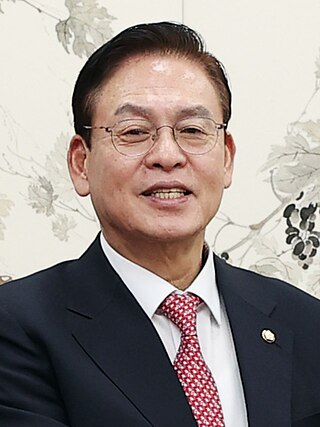
Chung Woo-taik is a South Korean politician who served as the former Governor of North Chungcheong from 2006 to 2010. He is currently the Member of the National Assembly for Sangdang since 2022.